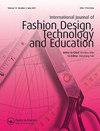Increasing objective and subjective knowledge of the environmental impact of cotton and polyester apparel: implications for educating future industry professionals
IF 2.2
Q3 BUSINESS
International Journal of Fashion Design, Technology and Education
Pub Date : 2023-11-03
DOI:10.1080/17543266.2023.2277259
引用次数: 0
Abstract
ABSTRACTThis study examined students’ knowledge of the environmental impact of cotton and polyester along with their intentions to use them for producing apparel. This is the first study to measure both objective and subjective environmental knowledge among students as future industry professionals. A survey was completed by 39 apparel students in the U.S. before and after a four-part project. Results demonstrate that students’ objective and subjective knowledge increased significantly after the project. Students demonstrated greater knowledge and types of facts about the environmental impact of cotton and polyester apparel after completing the project (objective knowledge). Moreover, students believed that after the project they knew more about the topic (subjective knowledge). Although intentions to use cotton or polyester fibres did not change for the total sample, there were important differences depending on the assigned position represented in a class debate conducted during the project. The results have important implications for educators.KEYWORDS: Objective knowledgesubjective knowledgecottonpolyesterenvironmental impact Disclosure statementNo potential conflict of interest was reported by the author(s).Additional informationFundingThis work was supported by Cotton Incorporated .增加对棉和聚酯服装对环境影响的客观和主观认识:对教育未来行业专业人员的影响
摘要本研究考察学生对棉和聚酯对环境影响的认知,以及他们使用棉和聚酯生产服装的意图。这是第一个测量学生作为未来行业专业人士的客观和主观环境知识的研究。一项调查是由39名美国服装专业的学生在一个四部分项目前后完成的。结果表明,项目实施后,学生的客观知识和主观知识均有显著提高。在完成项目后,学生展示了更多关于棉和涤纶服装对环境影响的知识和事实类型(客观知识)。此外,学生们认为在项目完成后,他们对主题有了更多的了解(主观知识)。尽管使用棉花或聚酯纤维的意图在整个样本中没有改变,但根据在项目期间进行的课堂辩论中所分配的立场,存在重要差异。研究结果对教育工作者具有重要意义。关键词:客观知识主观知识聚酯环境影响披露声明作者未报告潜在的利益冲突。本研究得到棉花公司的支持。
本文章由计算机程序翻译,如有差异,请以英文原文为准。
求助全文
约1分钟内获得全文
求助全文
来源期刊

International Journal of Fashion Design, Technology and Education
Arts and Humanities-Visual Arts and Performing Arts
CiteScore
3.10
自引率
0.00%
发文量
36
 求助内容:
求助内容: 应助结果提醒方式:
应助结果提醒方式:


